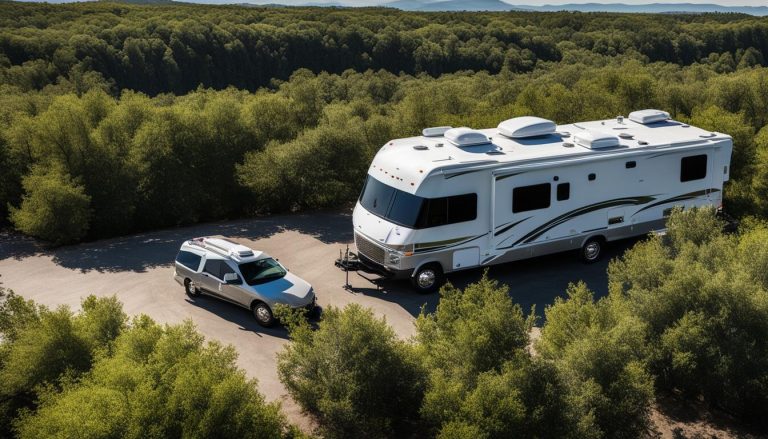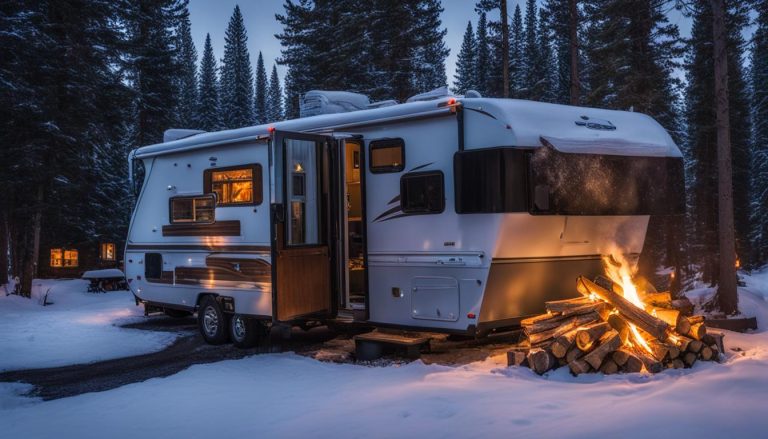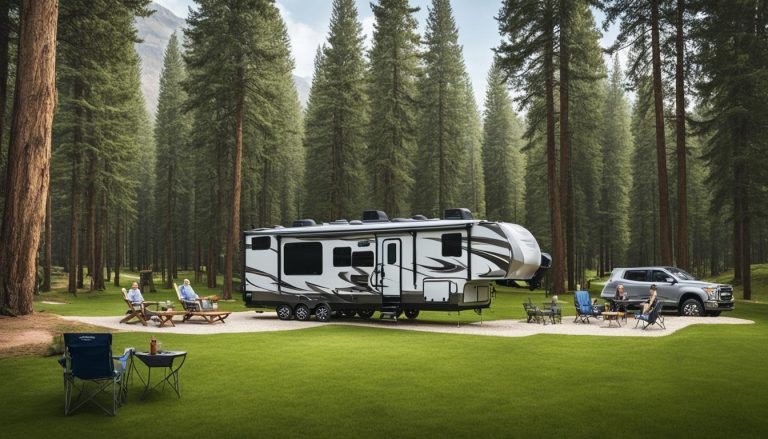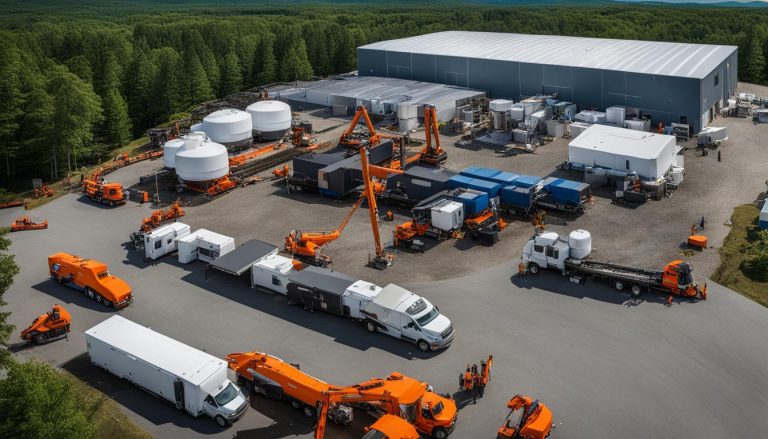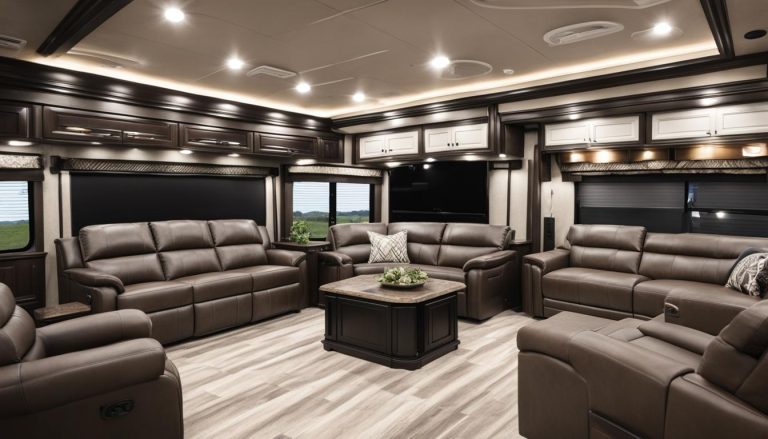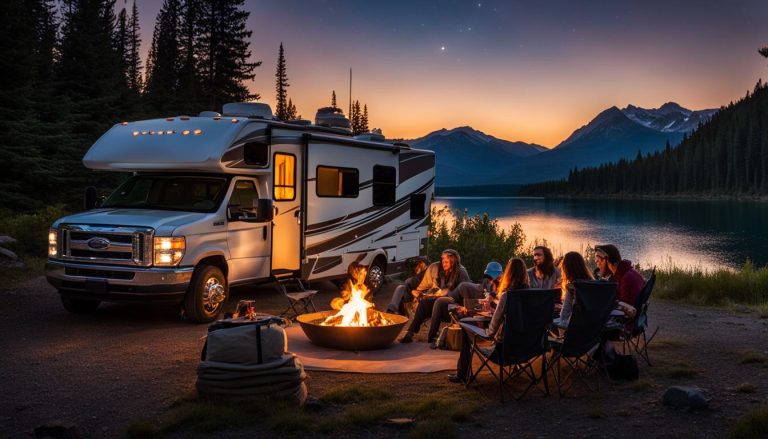RV Internet Solved: How to Get WiFi in Your RV
gorvlifestyle.com and its partners may earn a commission if you purchase a product through one of our links
Many campers are now hitting the road full-time with their mobile RV WiFi, working remotely while exploring national and state parks. However, finding the best RV WiFi solution can be confusing with so many options available. In this article, we will break down the different options for getting WiFi in your RV and help you choose the best solution for your needs.
Key Takeaways:
- Learn how to get WiFi in your RV with these helpful solutions.
- Discover the advantages and considerations of using your phone as a hotspot.
- Explore the benefits of mobile hotspot routers and signal boosters for reliable RV WiFi.
- Find out about satellite internet options for RVers who travel to remote areas.
- Enhance campground WiFi with WiFi boosters or repeaters to improve internet speeds.
Using Your Phone as a Hotspot
One option for getting WiFi in your RV is to use your smartphone as a personal hotspot. This allows you to utilize your phone’s data to connect other devices to the internet. Each cell phone carrier offers their own unlimited plan, but it’s important to consider factors like coverage, data speed, and potential data throttling. Using your phone as a hotspot is ideal for shorter trips or when data usage is not critical.
When using your phone as a hotspot, make sure to check your carrier’s hotspot capabilities and data limits. Some carriers may offer dedicated hotspot plans, while others include hotspot usage as part of their unlimited plans. It’s important to understand any limitations or restrictions on your plan to avoid unexpected charges or disruptions to your internet connection.
When setting up your phone as a hotspot, follow these steps:
- Go to the settings menu on your phone.
- Select the “Hotspot” or “Tethering” option.
- Enable the hotspot feature.
- Set a password for the hotspot to secure your connection.
- Connect your other devices to the hotspot using the provided password.
Keep in mind that using your phone as a hotspot will consume data from your cellular plan, so it’s important to monitor your usage and adjust your activities accordingly. Streaming videos, downloading large files, or online gaming can quickly deplete your data allowance.
If you plan to use your phone as a hotspot frequently or rely on it as your primary source of internet in your RV, consider investing in an unlimited data plan or a plan with a higher data cap to avoid potential overage charges. Additionally, you may want to research signal boosters or external antennas to enhance your phone’s connectivity and improve the reliability of your hotspot connection.
Pros of Using Your Phone as a Hotspot
- Convenient and portable: Your phone is always with you, making it easy to set up a hotspot wherever you have cellular coverage.
- No additional devices required: Using your phone eliminates the need for extra equipment or subscriptions.
- Flexible data options: Choose a cellular plan that suits your data needs, whether it’s an unlimited plan or one with a specified data allotment.
Cons of Using Your Phone as a Hotspot
- Data restrictions: Depending on your plan, there may be limitations on the amount of data you can use for hotspot purposes.
- Potential data throttling: Some carriers may slow down your data speeds after reaching a certain data threshold.
- Reliance on cellular coverage: If you’re in an area with poor cell reception, your hotspot connection may be unstable or not available at all.
Using your phone as a hotspot can be a convenient and cost-effective solution for getting WiFi in your RV. However, it’s important to evaluate your data needs and consider other options if you require a more robust and reliable internet connection during your travels.
Mobile Hotspot Routers
Looking for a reliable way to get WiFi in your RV without the hassle of cords and cables? Consider using a mobile hotspot router. This versatile device acts as a standalone modem, bringing WiFi directly into your RV. With a mobile hotspot router, you can enjoy internet connectivity on all your devices, from smartphones to laptops, wherever you go.
Each mobile carrier offers their own version of a hotspot device, allowing you to add it to your existing mobile phone plan. This means you can enjoy the convenience and flexibility of WiFi in your RV without having to sign up for a separate data plan. Simply connect your devices to the hotspot’s WiFi network, and you’ll be ready to browse, stream, and work on the go.
However, it’s important to note that the effectiveness of the mobile hotspot router will depend on the coverage provided by your carrier. If you plan to travel to remote or rural areas, it’s crucial to research the coverage map of your chosen carrier to ensure reliable and fast internet access.
Signal Boosters for Improved WiFi Speed
To further enhance the WiFi experience in your RV, consider using signal boosters. These devices amplify the cell phone signals in your area, resulting in improved WiFi speed and connectivity. Signal boosters are especially beneficial when camping in areas with weak or spotty reception.
By investing in a signal booster, you can say goodbye to slow internet speeds and frustrating buffering. The booster will enhance the cellular signal, allowing you to stay connected and enjoy a reliable WiFi connection in your RV. Whether you’re working remotely, streaming your favorite shows, or keeping in touch with loved ones, a signal booster can significantly improve your internet experience.
Combine a mobile hotspot router with a signal booster, and you’ll have a powerful solution to stay connected and enjoy fast WiFi in your RV, no matter where your adventures take you.
| Mobile Hotspot Routers | Signal Boosters |
|---|---|
| Acts as a standalone modem | Amplify cell phone signals |
| No need for cords or cables | Improved WiFi speed and connectivity |
| Add to your existing mobile phone plan | Enhance WiFi experience in RV |
Satellite Internet
For RVers who frequently travel to remote or rural areas, satellite internet can provide reliable WiFi coverage. Satellite internet has the widest coverage area and can provide internet access anywhere with a clear view of the sky. While there are currently limited options for portable satellite internet, Starlink Roam (formerly known as Starlink RV) offers satellite internet plans specifically designed for RVers. It is important to note that satellite internet may have latency issues or slower speeds in certain areas.
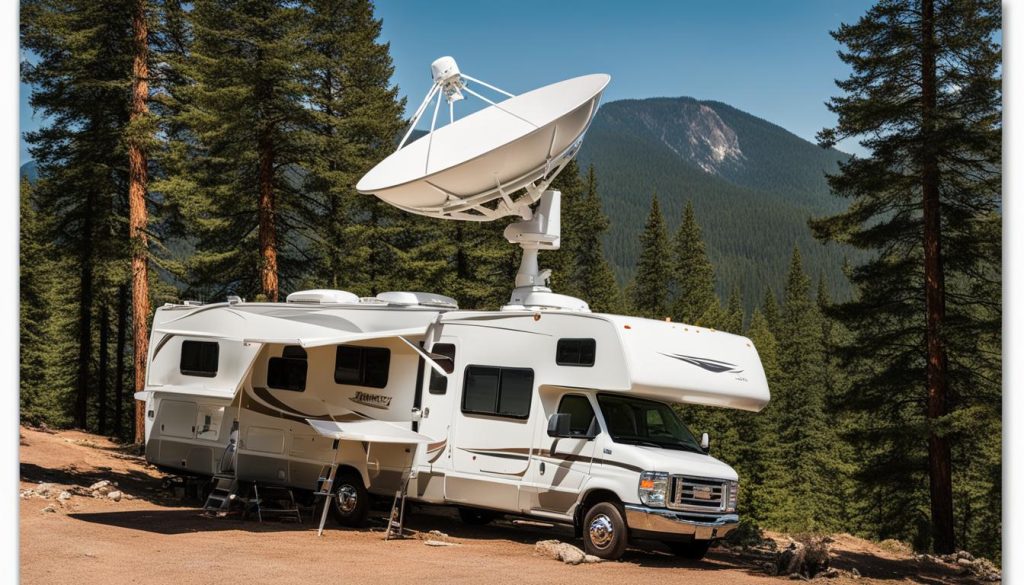
Pros and Cons of Satellite Internet for RVers
| Pros | Cons |
|---|---|
| Wide coverage area | Latency issues in certain areas |
| Reliable internet access | Slow speeds in certain areas |
| Specific plans for RVers | Limited portable satellite options |
Campground WiFi and WiFi Boosters
Many campgrounds and RV parks offer WiFi for guests, allowing you to stay connected while on the road. However, the quality and speed of the campground WiFi connection can vary, leaving you with frustratingly slow internet speeds. Fortunately, there are ways to enhance the campground WiFi signal and improve your internet experience in your RV.
One option is to use a WiFi booster or repeater. These devices work by amplifying the existing WiFi signal, extending its range and improving its strength. By placing a WiFi booster in your RV, you can rebroadcast the campground WiFi signal and enjoy faster and more reliable internet speeds.
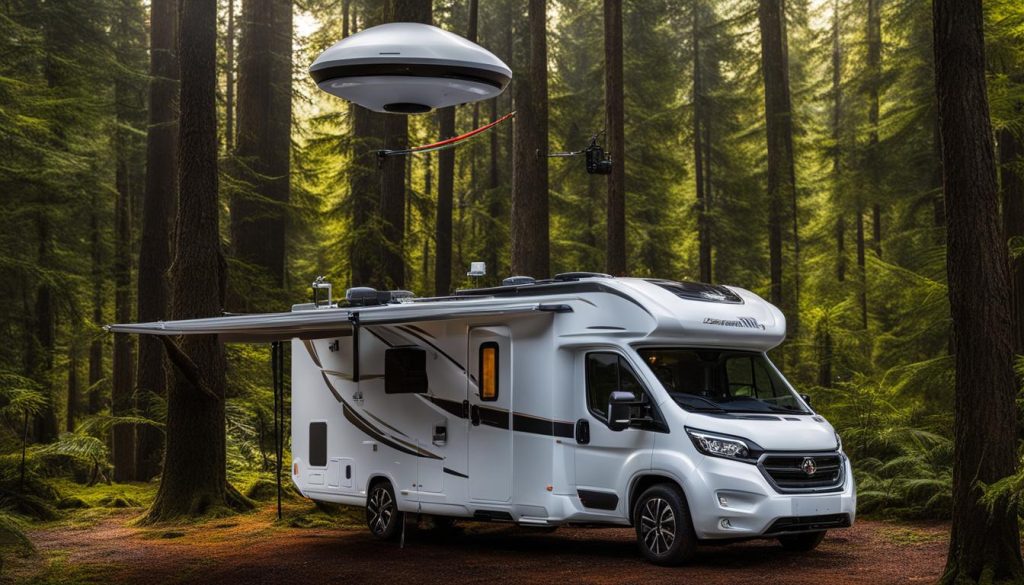
Using a WiFi booster not only helps improve the speed and reliability of the campground WiFi, but it also allows you to connect multiple devices to the internet simultaneously. Whether you need to work, stream movies, or video chat with family and friends, a WiFi booster can ensure that you have a strong and reliable internet connection in your RV.
It’s important to note that while a WiFi booster can enhance the campground WiFi signal, the overall speed and quality of the connection may still be slower than what you’re used to at home or public WiFi sources. Factors such as the number of users connected to the network and the distance between your RV and the WiFi source can impact the performance of the WiFi signal.
When selecting a WiFi booster for your motorhome, consider factors such as compatibility with your RV’s WiFi system, ease of installation, and customer reviews. Popular brands like Winegard, Alfa Network, and Bearifi offer reliable WiFi booster options specifically designed for RVs.
Mobile Hotspot Plans
If you’re looking for a convenient way to get WiFi in your RV, mobile hotspot plans offered by cell phone carriers can be a great option. These plans allow you to use your smartphone as a hotspot device, providing internet connectivity for multiple devices.
Carriers such as T-Mobile, Verizon, AT&T, and Visible offer a variety of hotspot plans with different data limits and pricing options. When choosing a mobile hotspot plan, it’s essential to consider your data usage and connectivity needs to ensure you select the best plan for your RV WiFi setup.
By utilizing a mobile hotspot plan, you can easily connect your RV to the internet, allowing you to stay connected while on the road. Whether you need to work remotely, stream your favorite shows, or simply stay connected with friends and family, mobile hotspot plans provide the flexibility and convenience you need.
Benefits of Mobile Hotspot Plans
There are several advantages to using a mobile hotspot plan for your RV WiFi setup:
- Portability: With a mobile hotspot plan, your internet connection travels with you wherever you go. You’re not limited to a specific location and can access WiFi even while exploring remote areas.
- Multiple device connectivity: Mobile hotspot plans allow you to connect multiple devices to the internet simultaneously, including laptops, tablets, smart TVs, and more.
- Easy setup: Setting up a mobile hotspot is a straightforward process. Simply enable the hotspot feature on your smartphone, and you’re ready to connect your RV and other devices to the internet.
- Flexible data usage: Depending on your carrier and plan, you can choose from different data limits to match your usage needs. Whether you require a high data allowance for streaming or prefer a more cost-effective plan, there are options available for every budget.
With the convenience and flexibility of mobile hotspot plans, you can enjoy reliable internet access in your RV without the need for additional equipment or complicated setup processes. Stay connected and make the most of your RV travels with a mobile hotspot plan tailored to your needs.
“Mobile hotspot plans offer a convenient and reliable solution for getting WiFi in your RV while on the go. With the flexibility to connect multiple devices and the portability to travel anywhere, these plans ensure that you stay connected no matter where your adventures take you.”
Free Public Wi-Fi and Internet Provider Hotspots
When you’re traveling in your RV, you may come across free public Wi-Fi networks in certain areas. These networks can provide temporary internet access, allowing you to stay connected while on the go. However, it’s important to keep in mind that the connection on these networks may be slow or unreliable, depending on the location and the number of users.
Another option to consider is taking advantage of internet provider hotspots. Some internet service providers offer hotspots or Wi-Fi networks for their customers, which can be accessed by subscribers. If you already have an internet plan with a specific provider, you may be able to connect to their hotspots for free or at a lower cost, providing a more reliable and secure internet connection for your RV travels.
It’s important to note that while free public Wi-Fi and internet provider hotspots can be convenient options for staying connected during your RV travels, they may not always be the best choice for reliable and fast internet access. Depending on your data needs and location, you may want to explore other options such as mobile hotspot routers or satellite internet for a more consistent and high-speed connection.
| Pros | Cons |
|---|---|
| Free or low-cost option for internet access | Connection may be slow or unreliable |
| Convenient if you’re already a subscriber to the internet provider | Access limited to specific areas or provider’s coverage |
| Can save on data usage from your mobile plan | May not be suitable for heavy internet usage or streaming |
If you decide to rely on free public Wi-Fi or internet provider hotspots, it’s always a good idea to secure your connection with a virtual private network (VPN) to protect your personal information and data from potential security risks.
Accessories for Setting Up Internet in Your RV
To optimize your RV internet setup, there are several accessories available that can significantly enhance your connectivity. By investing in these tools, you can ensure a reliable and fast internet connection while you travel.
One essential accessory is a WiFi extender or repeater, which effectively boosts the signal from campground WiFi networks. This allows you to enjoy a stronger and more stable WiFi connection inside your RV. With a WiFi extender, you can say goodbye to frustrating slow speeds and frequent disconnections.
Another valuable accessory is a signal booster, designed to amplify cell phone signals in areas with weak reception. This means you can easily make calls, send messages, and access the internet, even in remote locations. By improving your cell signal, a signal booster ensures that you never miss an important message or experience frustrating dropped calls.
To create a localized WiFi network inside your RV, a router specifically designed for RV use is a must-have. This router enables you to connect multiple devices, such as smartphones, laptops, and smart TVs, to a single network. With a dedicated RV WiFi network, you can effortlessly stream movies, upload photos, and work remotely without experiencing any lag or buffering.
Finally, it’s crucial to have a backup internet plan to address any unforeseen connectivity issues. This could involve having a secondary internet provider or a portable hotspot device as a reliable backup option. By combining multiple internet options, you can ensure consistent internet access no matter where your adventures take you.
Should I use my phone as a hotspot to get WiFi in my RV?
Yes! Using your phone as a hotspot is a common and convenient way to get WiFi in your RV. It allows you to utilize your phone’s data to connect other devices to the internet. Each cell phone carrier offers their own unlimited plan, but it’s important to consider factors like coverage, data speed, and potential data throttling. This option is ideal for shorter trips or when data usage is not critical.
What is a mobile hotspot router and how can it help me get WiFi in my RV?
A mobile hotspot router is a device that acts as a standalone modem and brings WiFi into your RV without the need for cords or cables. Each mobile carrier offers their own version of a hotspot device, which can be added to your existing mobile phone plan. However, the effectiveness of the hotspot will depend on the coverage of your carrier. Signal boosters can also be used to amplify cell phone signals and improve WiFi speed in your RV.
Can I use satellite internet to get WiFi in my RV while traveling to remote areas?
Yes! If you frequently travel to remote or rural areas, satellite internet can provide reliable WiFi coverage. Satellite internet has the widest coverage area and can provide internet access anywhere with a clear view of the sky. While there are currently limited options for portable satellite internet, Starlink Roam (formerly known as Starlink RV) offers satellite internet plans specifically designed for RVers. It is important to note that satellite internet may have latency issues or slower speeds in certain areas.
Does campground WiFi provide reliable internet access in my RV?
Many campgrounds and RV parks offer WiFi for guests, but the quality and speed of the connection can vary. One way to enhance the campground WiFi signal is to use a WiFi booster or repeater. These devices help rebroadcast the existing WiFi signal and improve internet speeds in your RV. However, it is important to note that campground WiFi may still be slower than home or public WiFi sources.
What are the best mobile hotspot plans for getting WiFi in my RV?
Mobile hotspot plans offered by cell phone carriers are a convenient option for getting WiFi in your RV. These plans allow you to use your smartphone as a hotspot device and connect multiple devices to the internet. Carriers like T-Mobile, Verizon, AT&T, and Visible offer various hotspot plans with different data limits and pricing options. It is important to consider your data usage and connectivity needs when choosing a mobile hotspot plan.
Can I rely on free public Wi-Fi networks or internet provider hotspots for WiFi in my RV?
While you may come across free public Wi-Fi networks in certain areas while traveling, these networks can provide temporary internet access. However, the connection may be slow or unreliable. Some internet service providers also offer hotspots or Wi-Fi networks for their customers, which can be a convenient option for RVers who are already subscribers to the provider’s internet service.
What accessories can I use to improve my RV internet setup?
There are various accessories available to improve your RV internet setup. These include WiFi extenders or repeaters to enhance campground WiFi signals, signal boosters to amplify cell phone signals, and routers to create a localized RV WiFi network. Additionally, it is important to have a backup internet plan in case of connectivity issues. By combining multiple internet options, you can ensure consistent internet access while traveling in your RV.

